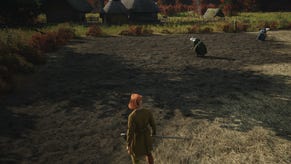Ron Gilbert, Pt. 2: Legacy, Learning, And... Diablo?
"unrelated object B"
Yesterday, I had a chat with the first half of Ron Gilbert about his upcoming descent into madness (and in the game), The Cave. Shortly after, the other half of Ron Gilbert teetered awkwardly into the room, so I decided to speak with it as well. In this very special non-Cave-flavored episode, we discuss goofy adventure game logic, the ups and downs of being inextricably tied to a legendary hit like Monkey Island, leaving a legacy, rebelling against that legacy, and kids games like the secretly-completely-rad Pajama Sam. Also Diablo III for some reason. The thrilling conclusion's after the break.
RPS: Old-school adventure puzzle design is sort of... in some cases, it's very obtuse. You have to really get into adventure game logic to understand what you're doing. Obviously, The Cave has its water-powered hotdog machine, but that aside, over the years, how has your approach to designing these things changed?
Ron Gilbert: I think my approach over the years has been probably to do less and less just ridiculous solutions to puzzles. It was always, from the beginning, I always tried to make it so that, if solving the puzzle made no sense when you were doing it, it at least made sense after you'd done it. After you'd done it, you think, "Oh, okay, I see how that could probably work. Maybe I should have thought of sticking the pencil in the whatever."
But I think over the years, I just shied more and more away from that, in that I think things should really make a lot more logical sense when you're doing them. It isn't about combining completely unrelated object A with completely unrelated object B, and then getting some puzzle solution out of that. Yeah, it's funny that it happened, but it just doesn't make a lot of sense. So I think with The Cave, it's trying to get the puzzles in such a way that they make a little more logical sense when you're putting them together.
RPS: Do you think, though, that there's a chance people will actually miss that aspect of adventure games? I mean, if you mention point-and-click adventures to people, they're like, "Oh yeah, really silly puzzle solutions!" I feel like it's this strange part of the nostalgic appeal. It's not necessarily on paper a "good" thing, but people still like it.
Ron Gilbert: Yeah, I'm sure there are going to be people that miss that aspect of it. And there certainly are fun parts of that. But I think to a lot of other people, that was just a frustrating part of adventure games. So I think some people certainly will miss it, but in some ways I think it's a good thing to miss it. And I think when adventure games started to lose their popularity, it was just that those goofy things... there were just too many of them, and it made no sense again. We're trying to pull back a little more into the realm of sanity. Even if I was going to make just a pure point-and-click adventure game, I wouldn't put all that ridiculous stuff in it at all. I think that's more of a design evolution than anything.
RPS: Both you and Tim Schafer have this very powerful and fondly-remembered legacy. Whenever people mention either of you guys, it's usually followed shortly by Monkey Island or another classic along those liens. But by the same token, what's it like to be so attached, at least in terms of association, to a single or a couple games? Does it ever become almost, well, irritating to not be able to distance yourself from things you worked on so many years ago?
Ron Gilbert: [chuckles] Yeah, in some ways it can be, because, you know, whenever you talk about doing something and it's not a point-and-click adventure game done in 2D with 320 by 240 resolution, there's suddenly [cries of] "Oh my God, what exactly are you doing?" You're always trying to be able to do something new and have people be really interested in it rather than just criticizing it because it's new. But on the other hand, it's nice to have so many people that like something you did so much. I can't complain at all.
RPS: So when you did Deathspank, was it kind of a reaction to that mentality? I mean, it still had elements of puzzles and stuff to it, but it was still a very different sort of game. Was that in any way you saying, "I'm going to make something different now. Screw you guys"?
RG: Yeah, with Deathspank I wanted to make something that was a little more Diablo-esque. I love Diablo, I've played that game a ton, and I like World of Warcraft. I'm obsessed with that game. And so that's a genre of game that I play a lot, and I always wanted to make one of those. From a design perspective, I just love this whole concept of skill trees, that whole thing about RPGs just fascinates me.
And so, Deathspank was wanting to do some of that, but also marry it with the things that I do like about adventure games. I like the dialogues you have with characters. I thought that was always really neat. So I wanted to bring that into Deathspank. The original design for Deathspank was a lot more adventure game-ey than what it ended up being, back when the game was supposed to be episodic. And the combat was kind of that fun activity that you did when you were running in between puzzles - as opposed to the much more action-ey that it ended up being.
But I think for any designer, it's important to explore as many different genres as you can, because I think you always learn something by doing it. You can always bring something you know about adventure games to the RPG world or whatever.
RPS: So, conversely, was there ever a point where The Cave was - at least, by design - more complex? Did you ever consider adding skill trees or something like that to it?
Ron Gilbert: [laughs] No, I never did that. I mean, the very first incarnation of the game, which is about 25 years-old... that was a game that was really, really hard. It was just very, very intense puzzles, as far as how you worked your way through the cave. It was a very harsh, unforgiving game for the player. But again, that was a long time ago, before I'd ever done any real game design. I think there's this thing where a lot of really young designers, they become masochists in a way with the player. They revel in the player's failure. I was certainly in that mindset in the first incarnation of the game. So it's kind of changed in that sense, that it isn't this horribly difficult, hard game to work your way through, and it is something that is just more of an enjoyable experience for people to have.
RPS: That's also interesting to me, because I didn't actually put two and two together, I can't believe I didn't realize this until earlier today, but you founded Humongous Entertainment. Whenever I was a little, tiny kid, I played Freddie Fish and Putt-Putt and stuff. But anyway, you went from having these ideas for brutal adventure games that'd decimate the player to making something that's for kids. How much did you have to change your mindset to do that? And how did that, going forward, affect the way you approached game design from then on?
Ron Gilbert: Well, the Humongous Entertainment stuff, the whole idea for that company came from directly from watching four-year-olds play Monkey Island. Because they loved that game. They couldn't read, so they had no idea what the story was. They had no idea what the puzzles were that they were solving. But they loved running around this world, clicking on doors, opening and closing them, they loved picking up stuff, they loved giving things to people and having weird little animations happening. They had no understanding of what the game was. But there was just something that they just loved about running around this world.
And so my idea was, well, why not just build adventure games for them? Because there's obviously something about this adventure gaming that is really appealing to them. The idea was, okay, let's build real adventure games for them - not watered-down interactive storybooks, but real adventure games. But we'll simplify the puzzles and we'll fully voice them so they don't have to read and we'll get rid of the verbs so everything's just really simple. You click on stuff or you apply something to something. So that was really the whole genesis of that company.
I think what that really taught me as a designer was just the beauty of simplicity, that people really can get a lot of entertainment out of something that is really simple at its core. Because we used to get a lot of letters from parents who would describe how they would play Putt-Putt or Pajama Sam after the kids went to bed. They were just really good games. And these were parents who weren't gamers, because this was many years ago when most parents weren't gamers. They just loved these games, because they were simple and they were just an interesting experience that they could have in a way.
I think what the whole Humongous Entertainment thing taught me is just the simplicity of things. A lot of people,when they go in to play games, if they're not these hard, hardcore gamers, they just want to have a fun experience. They don't necessarily want something that's beating them on the side of the head continually. That's what I derive from that. Games should be a fun experience that people have.
RPS: Yeah, Pajama Sam was also amazing.
Ron Gilbert: Yeah, he was my favorite.
RPS: A co-worker [*cough* ALEC *cough*] wanted to know this one, and then I thought about it and it actually made sense, even though I'm pretty sure he asked me as a joke. The exact quote is, "Ask him what he thinks of Diablo III," and I was like, huh, he made Deathspank, so it actually fits. So have you gotten to play Diablo III at all?
Ron Gilbert: Yeah, I've played quite a bit of Diablo III. You know, it's interesting: it's been 12 years since Diablo II came out. I think there's like 12 years of nostalgia that built me up for that. And even though over those 12 years I've gone back and played Diablo several times through it, just playing Diablo III, it just reminded me of what a monotonous game that is. Like, oh, yeah... [bangs in a steady rhythm on the table] Yeah, oh, this is Diablo, yeah, yeah, they totally captured it. [laughter]
But I can't stop! I think that's the interesting thing about Diablo, is that it is an amazingly monotonous game, but there is something compelling about it. There is something that just keeps you going, keeps you through that level progression. "Oh, I can probably level if I just kill these next hundred guys. I'll do that before I go to bed." You know? It keeps pulling you on through that stuff.
But I don't think that Diablo III's captured me in the same way that Diablo II did. I don't think there was enough new and interesting about it. Yeah, the graphics are much better than Diablo II, but it's still that same camera. Yeah, it's 3D objects now, you get a little bit of this when you're moving around, but it's not fundamentally changed anything about it. I'll play all the way through it, but I don't know that I'll go back and play it five years from now like I did with Diablo II.
RPS: Have you had any issues with all the kind of connectivity stuff?
Ron Gilbert: Oh, I hate that. That really ticks me off. Because I'm never going to play Diablo III with anybody. Never going to PvP when that comes online. I'm never going to use their stupid auction house. I'm never going to do any of that stuff.
In terms of the single-player, yeah, that really annoyed me. I guess at some level I'm a little paranoid - I'm a little bit tinfoil-hat-ish - so I don't really like this giant corporation knowing every single time I play a game. I kinda feel like I should be able to play a game in the privacy of my own home and not have a company monitoring that whole process. So it's a little bit of that that goes on with me.
And then, I do wonder, well, how much of it is just their DRM? How much of it is they realize, well, we can do this DRM so nobody can pirate the game, but we're going to say it's because of the auction house, we're going to say it's because of this other stuff. I don't know. I'm really cynical about that online single-player stuff. But unfortunately I think it's the wave of the future.












